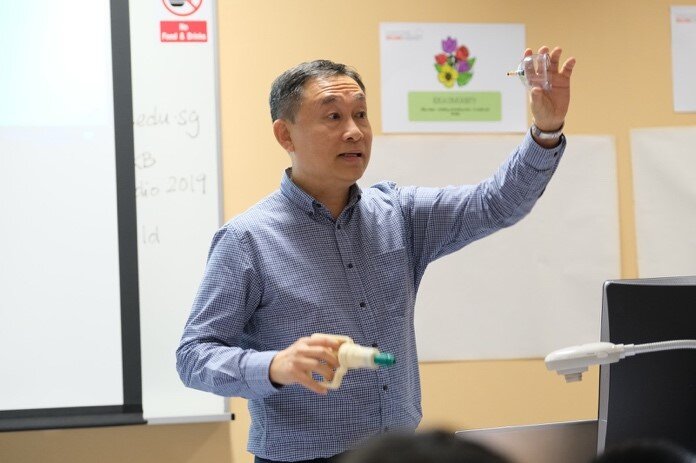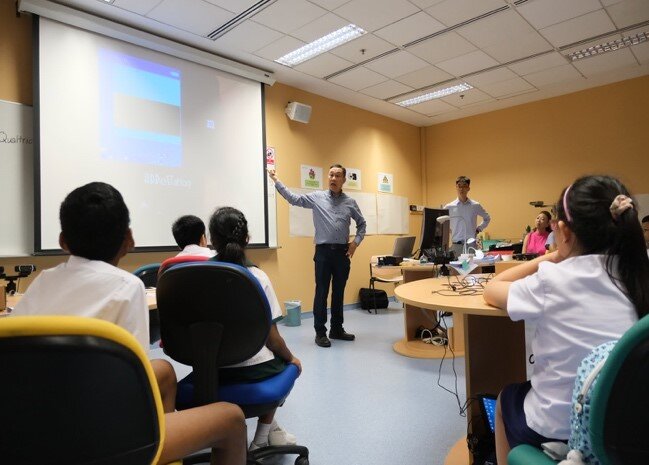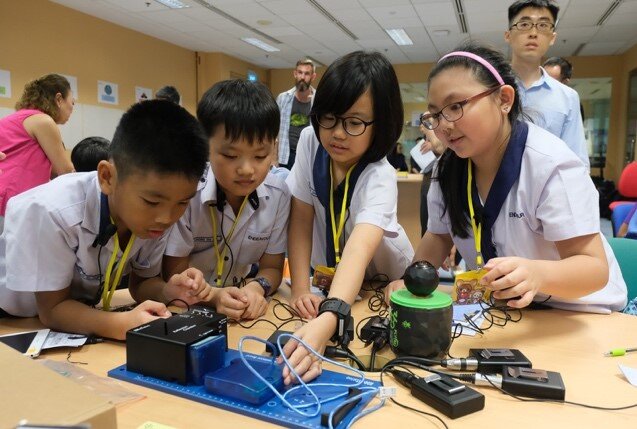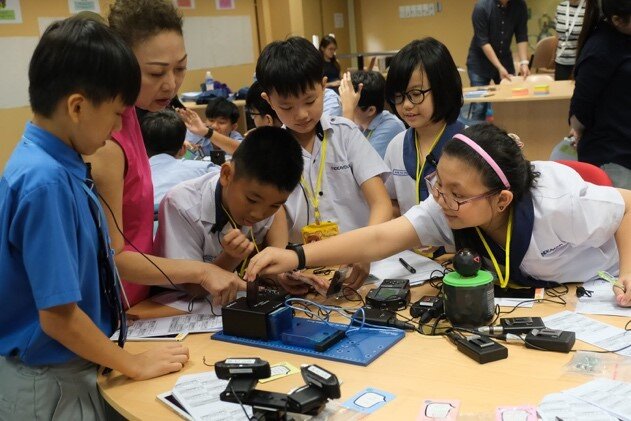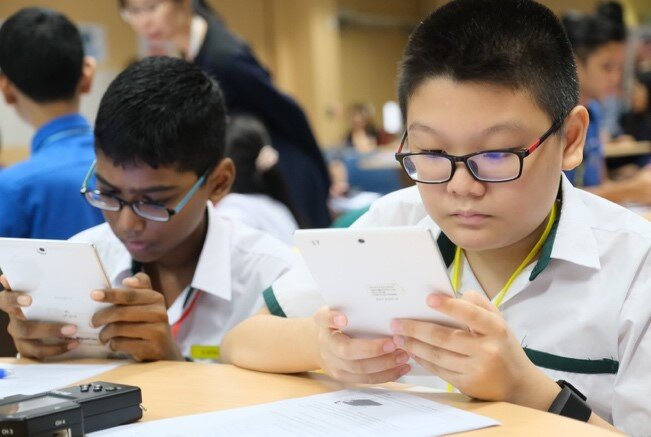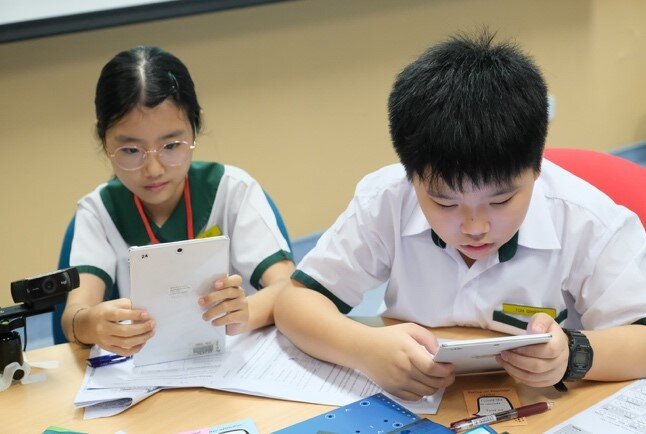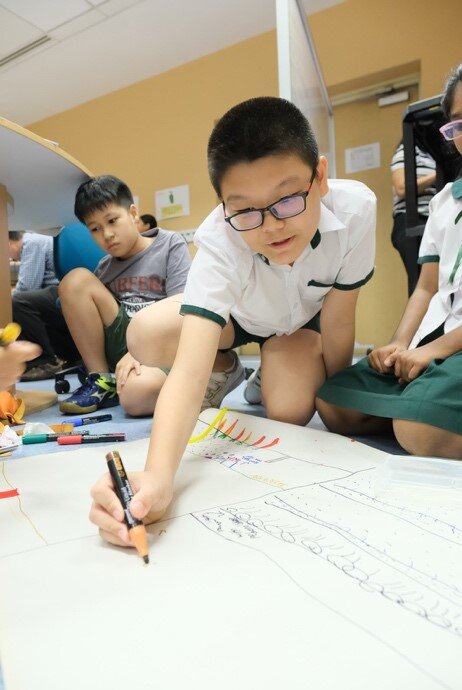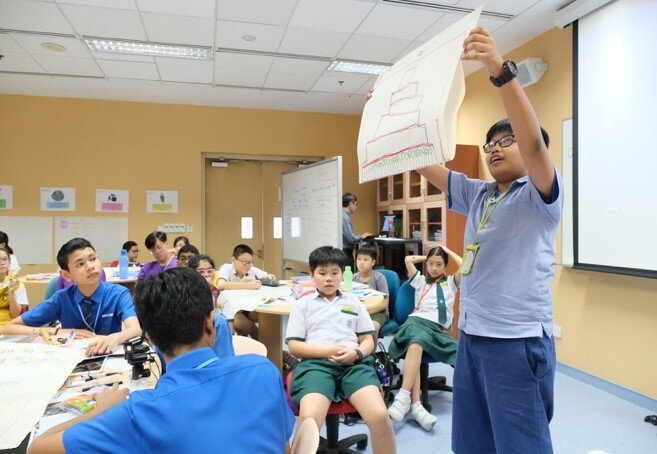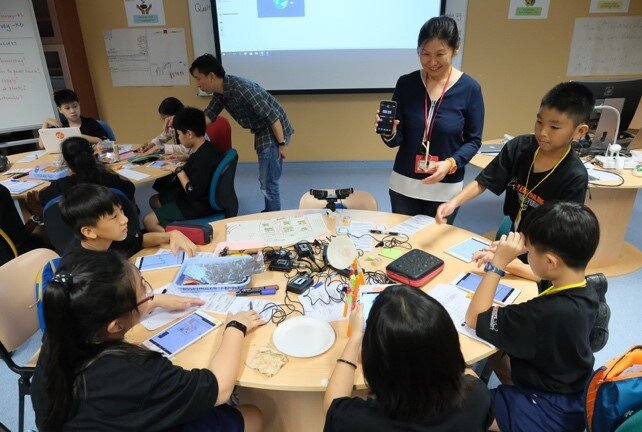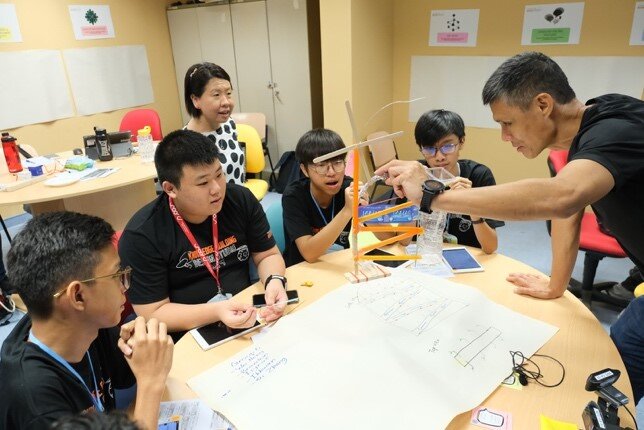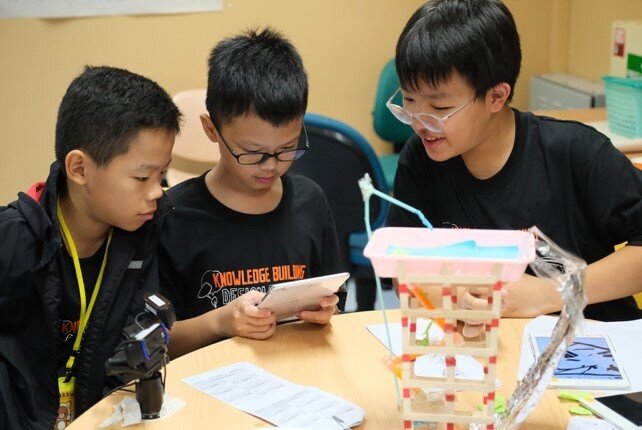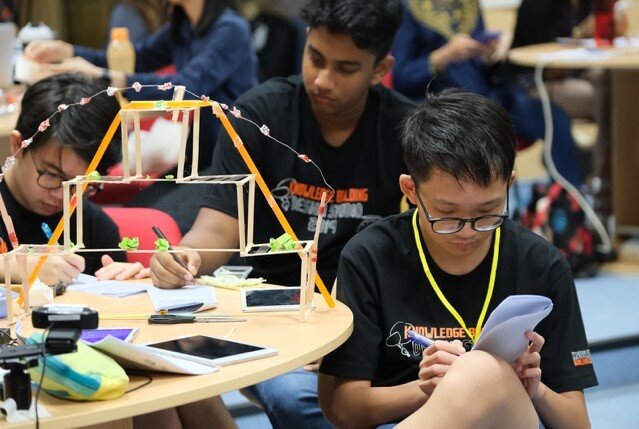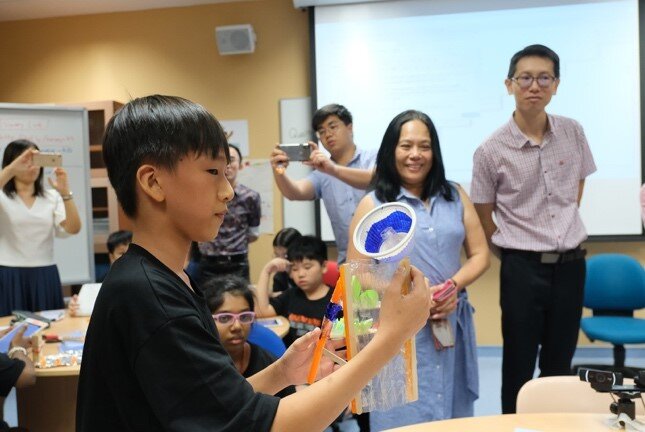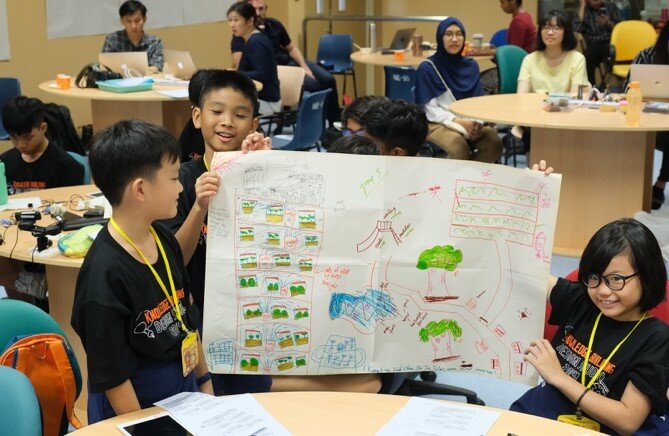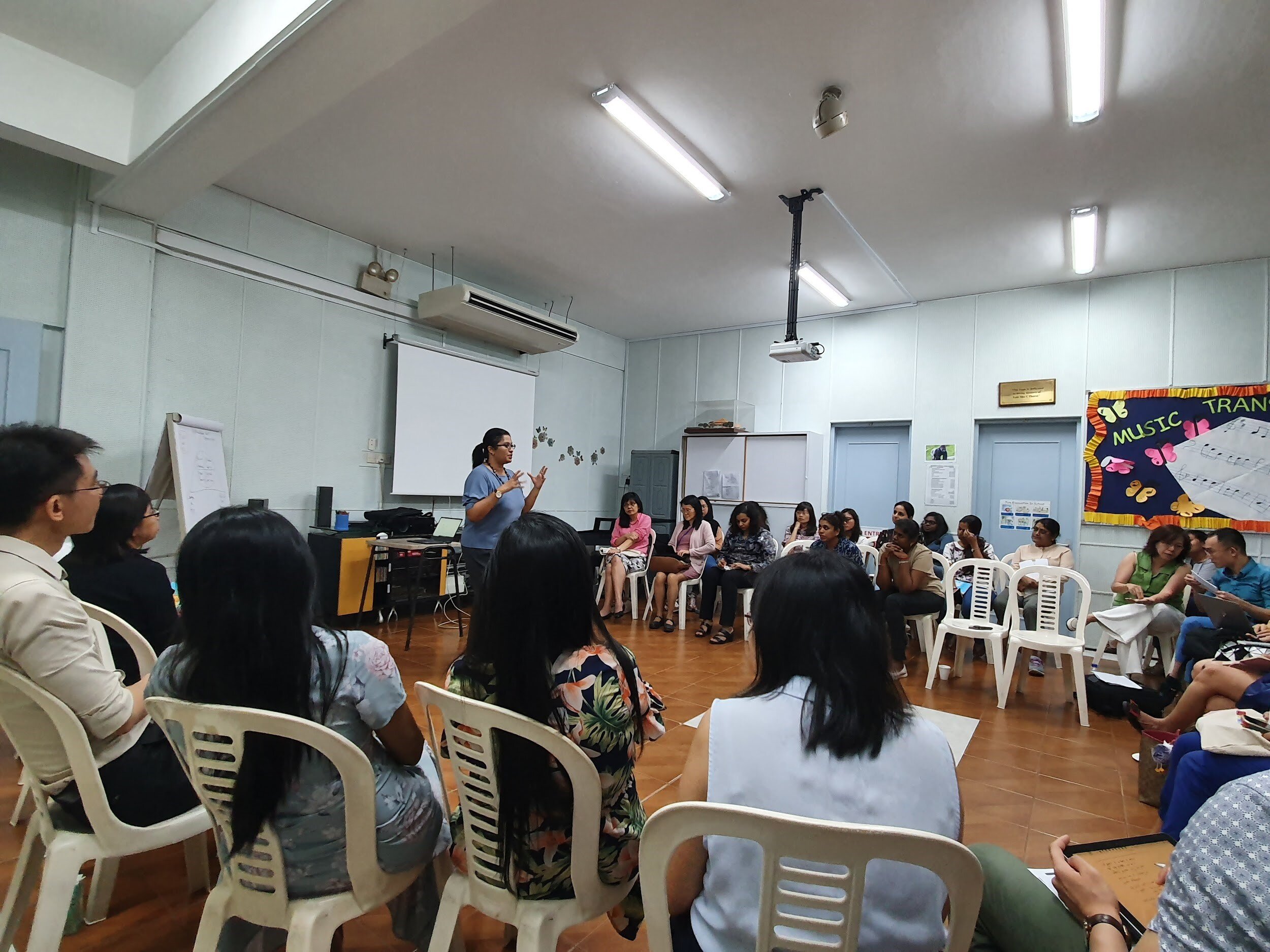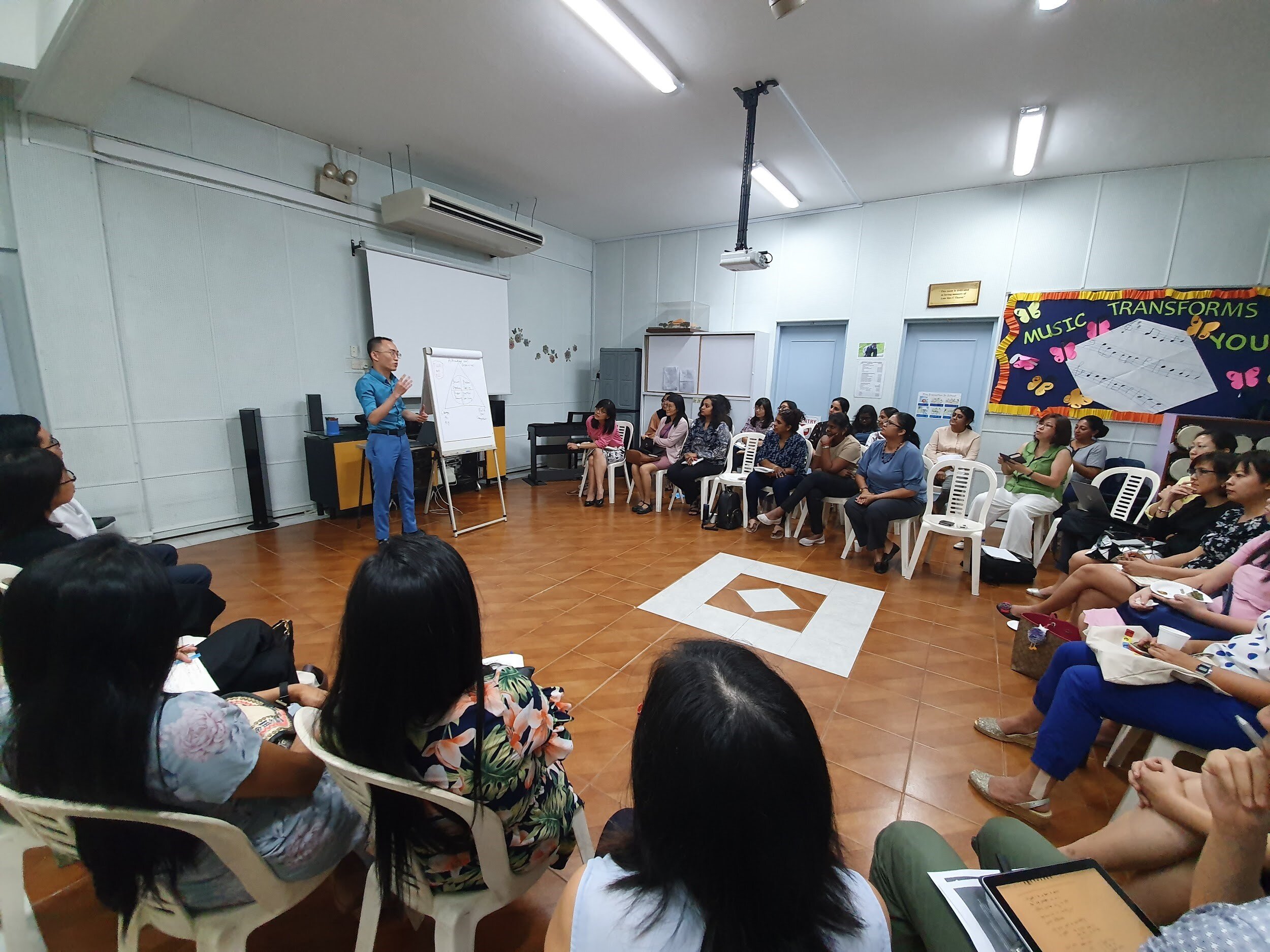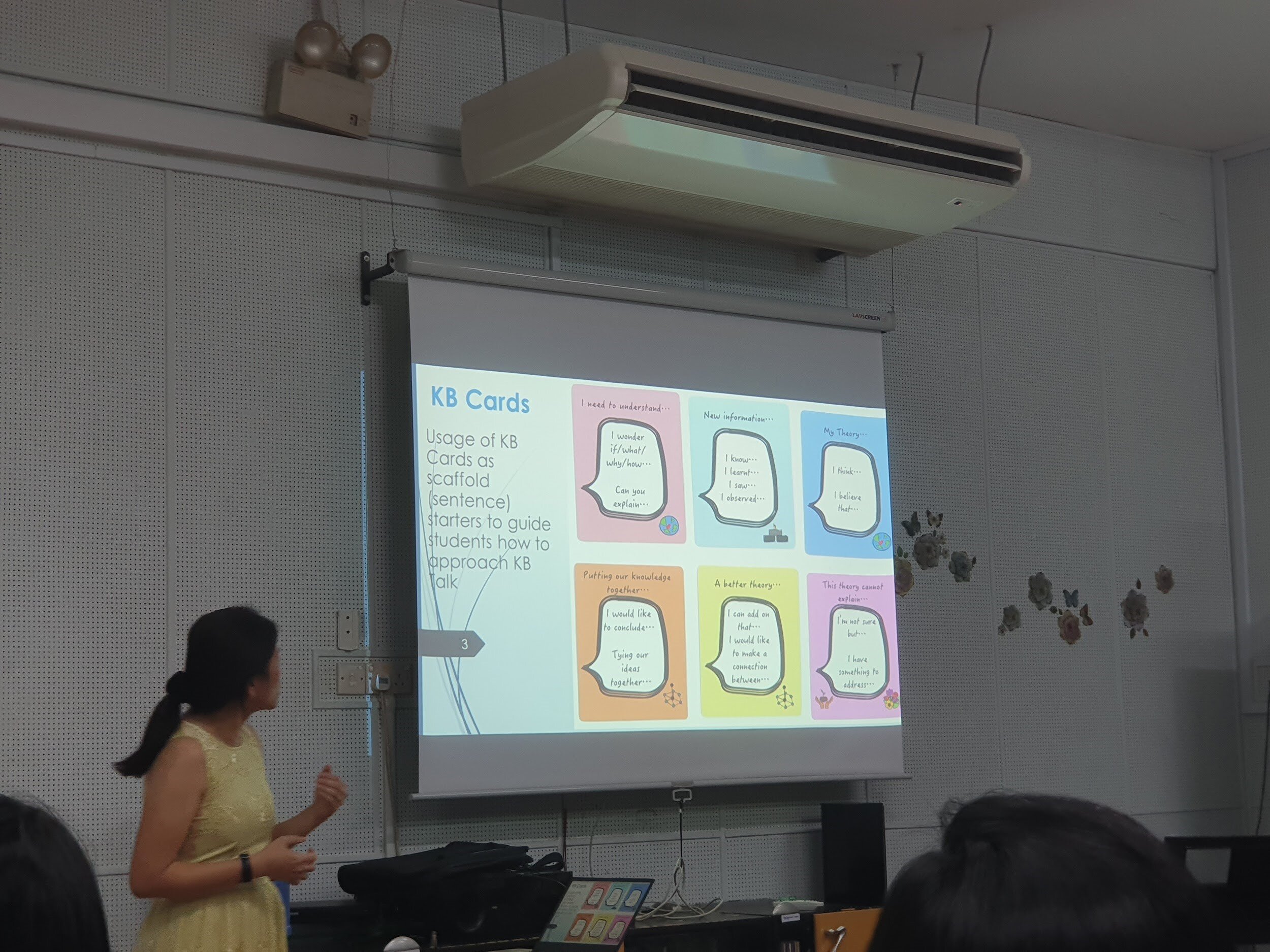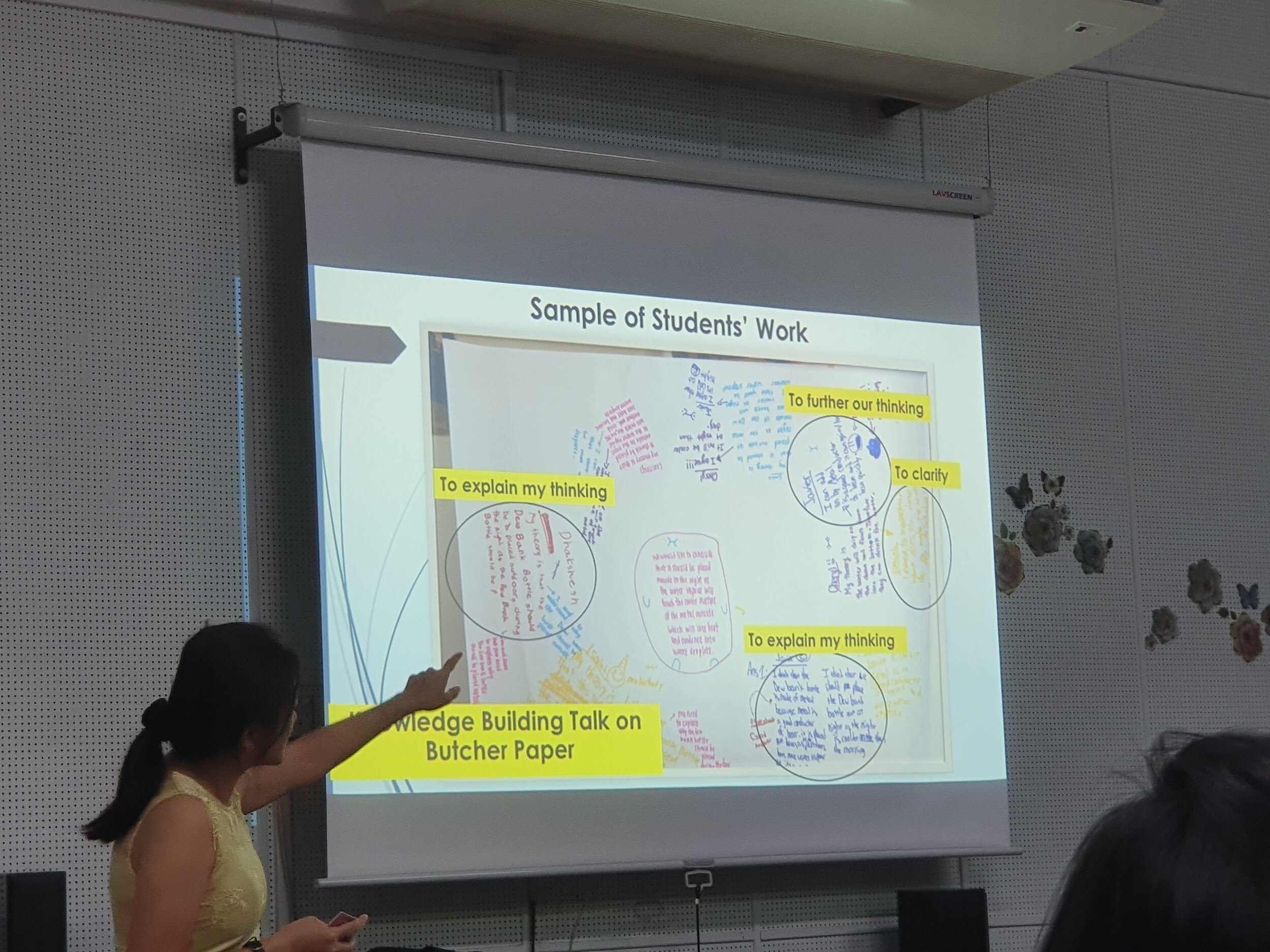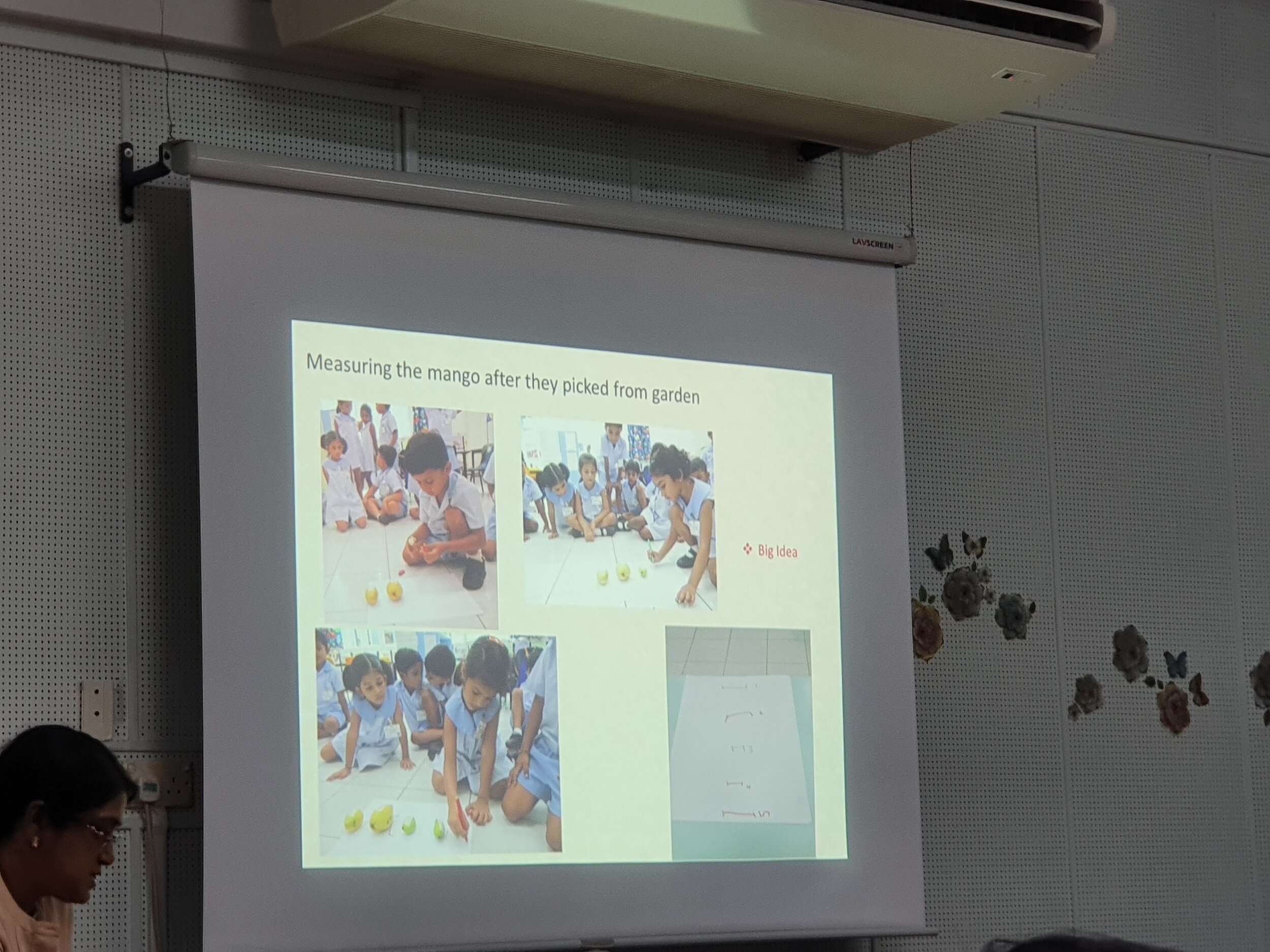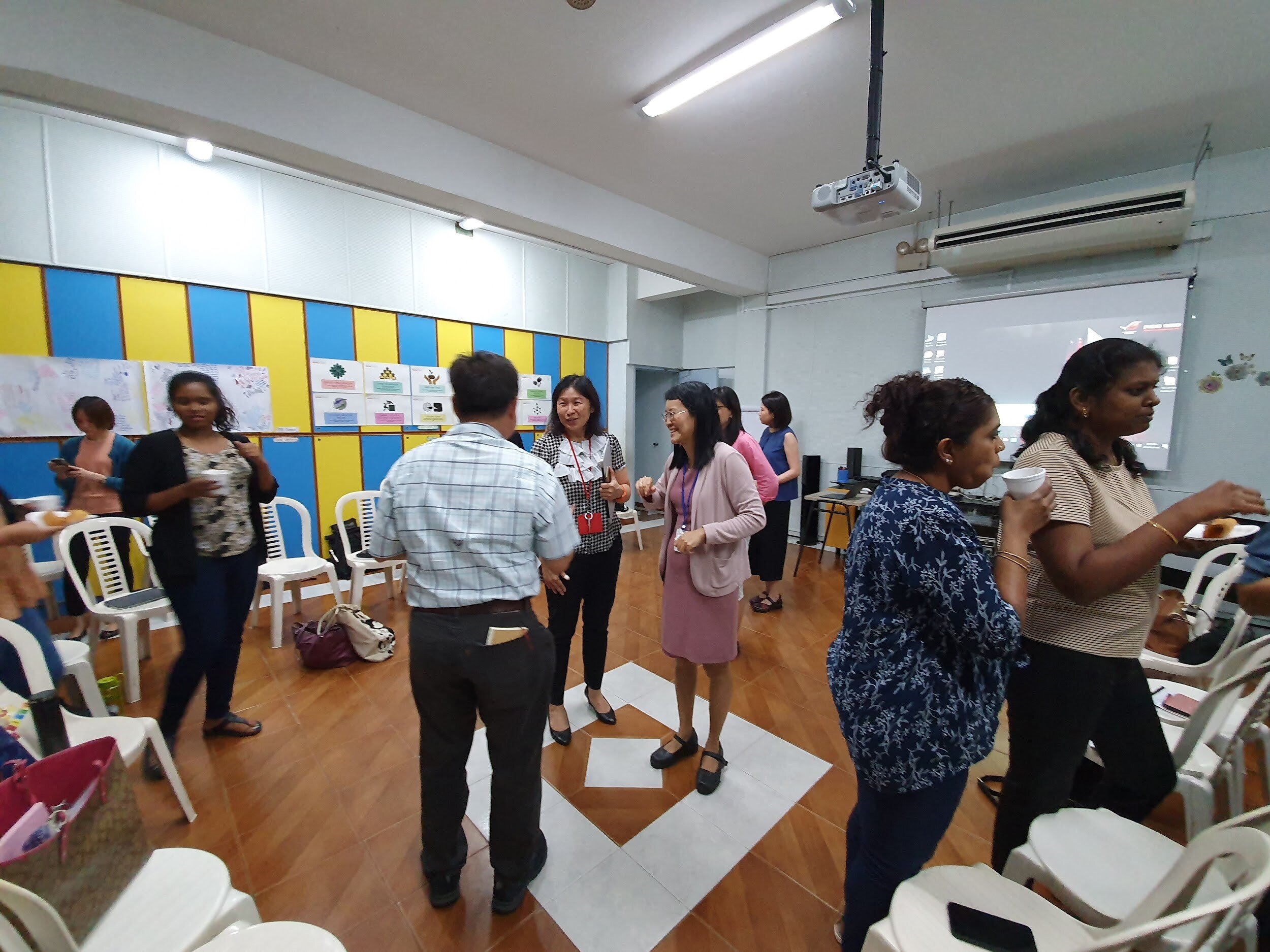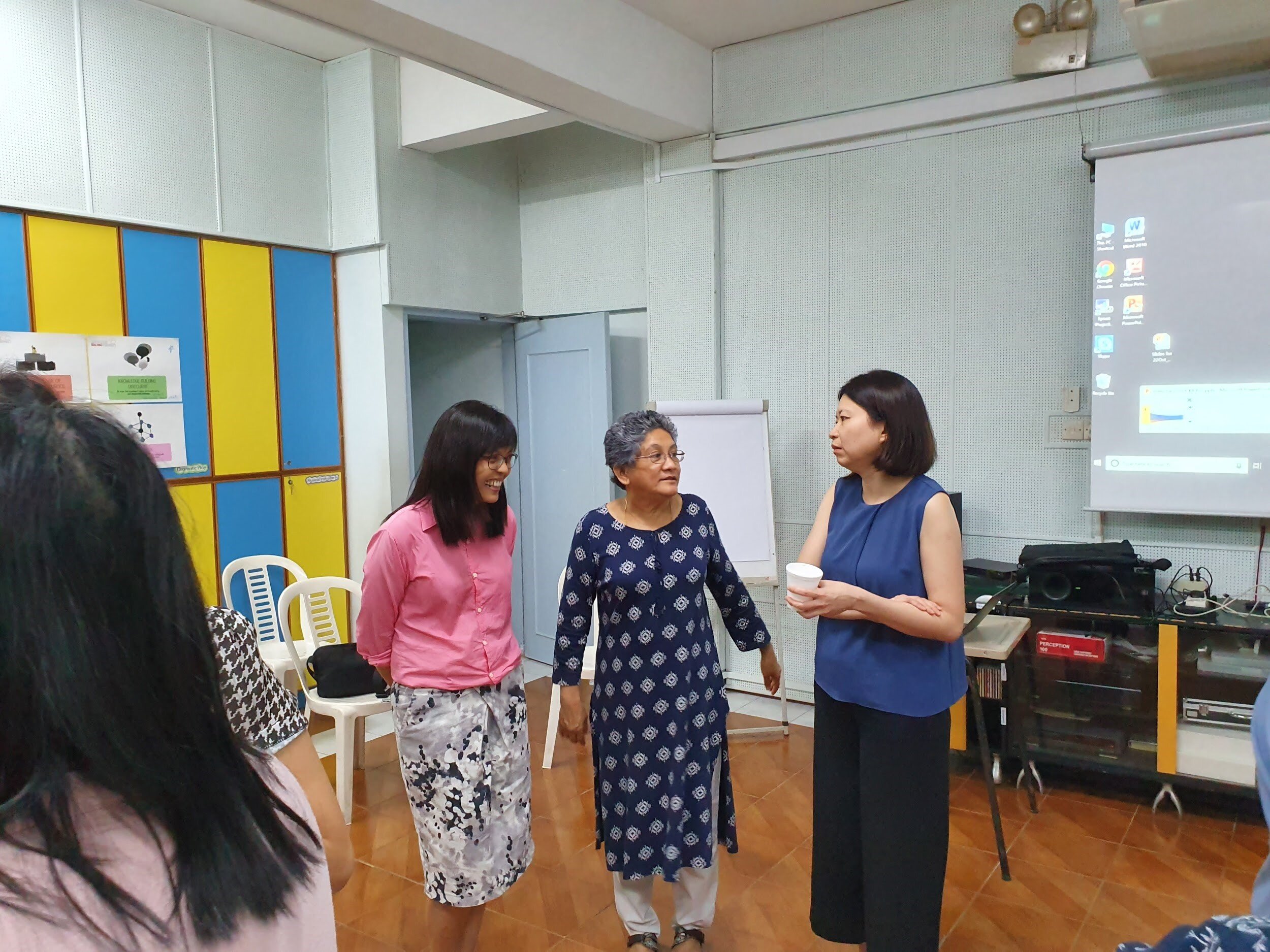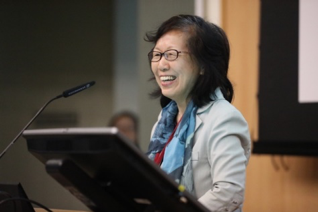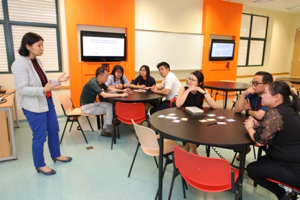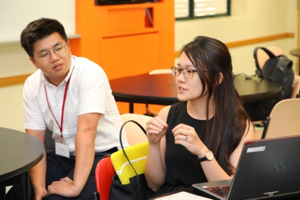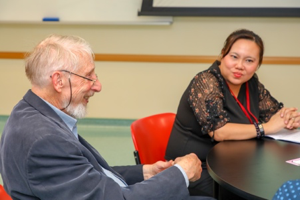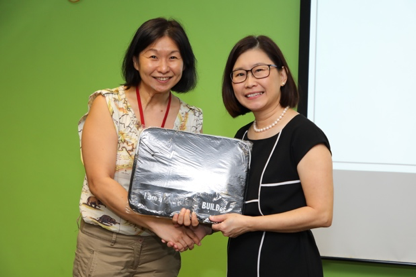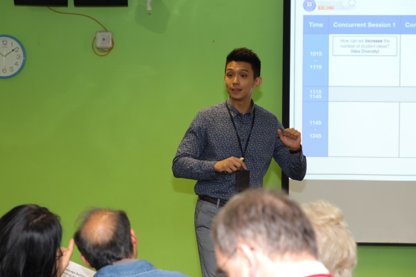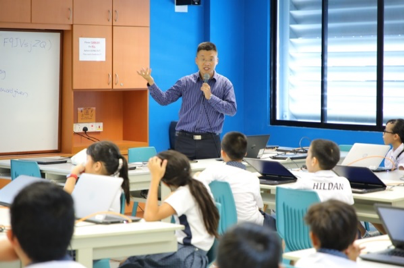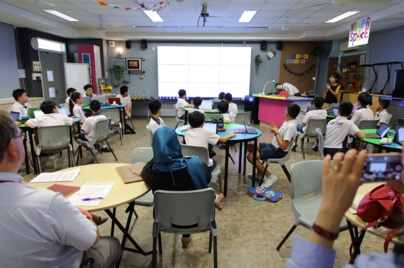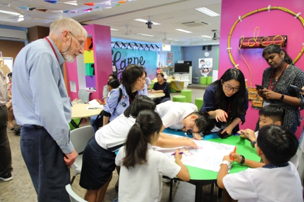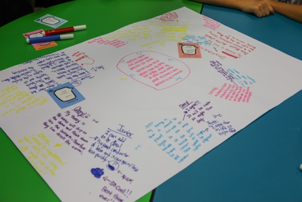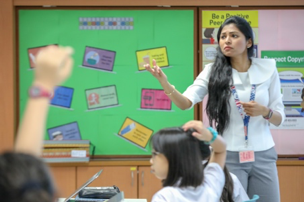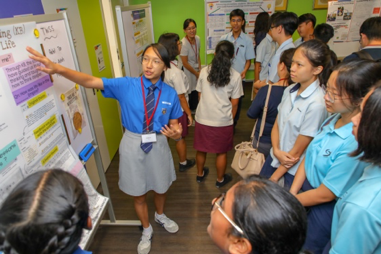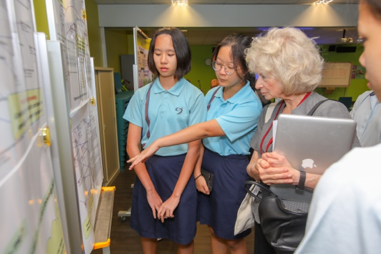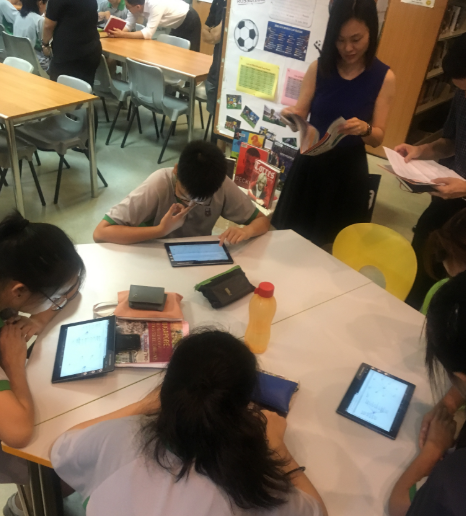This year’s Knowledge Building Design Studio, themed ‘Sustainable Cities and Communities’, took place on the 19th and 20th of November. It was a resounding success for both students and teachers who were involved in the camp.
“We love the building part and to be able to talk about the same problem on KF, is quite good. I really like it”.
- Student
“This is the best PD I have ever attended, to see what the student can do , really great!”
- Teacher
A Knowledge Building that cuts all age and experience barrier!
This year, the KB community moved away from sharing of practice to a more active design of a KB experience for students. From an idea conceptualised since January 201, the community of teachers and researchers felt that a small group of nominated students (3-5) from each school can take on the role of explaining knowledge building to their peers and other teachers when they returned to their classrooms with an enhanced KB experience through their interaction with experts and researchers at the KB Design Studio. The research component was integrated into the design studio as a way to consolidate the design and to translate into practical strategies, lessons and tools to be adopted back in schools to improve the KB practice.
The aim of the KB Design Studio was to engage students in KB discourse with scientists and environmentalists and give students a space to work creatively with ideas. Students of different ages and background proved that they are capable of designing, conducting research, improvement of ideas, creating and analysing prototypes that can tackle real world problems on sustainable food source and transportation.
The Design Studio adopted a highly collaborative approach to move beyond the boundaries of traditional research. Teachers and students were able to create and participate using research sites, work together with scientists and experts as a community, to advance the notion of a new environment and assessment for knowledge building. The knowledge building theories, pedagogies and technologies that were adopted in this Design Studio are derived from decades of Singapore-based innovation pedagogy research undertaken by the Learning Sciences group in NIE.
Outline of Activities
The Design Studio kicked off with a talks by experts about the life of a scientist to intrigue as well as motivate students to take an inquiry-driven perspective towards learning. This was followed by the presentation of the problem, which was to build a prototype that can be implemented in cities so as to promote sustainable living, posed for the students to work on for the rest of the Design Studio. Throughout the rest of the day, the students engaged with experts in vertical farming and sustainable living in order to grow their knowledge and to improve their ideas continuously. Students were able to engage in an experiments presented by the experts and subsequently used Knowledge Forum to share their ideas with their peers.
On the second day of the Design Studio, students started to build their prototype using the knowledge they had learned from the session with the experts the day before. Students had the opportunity to discuss the issues that they had in solving the overarching question and were involved in collecting and analysing data to improve their prototype. Finally, they had to present their prototype to a panel of scientists and representatives from the farming community.
Overall, the students’ responses were very encouraging and overwhelmingly positive. Teachers were initially worried that their students could not manage the tasks but the students excelled and were able to enjoy the learning process. The students reflected that they enjoyed working with friends from other schools, loved the challenging tasks – especially when tasked with the building of a vertical farming prototype and the subsequent sharing with the community. The students were able to advance their understanding on the Knowledge Forum, reflect on their emotions during the learning process, and above all, be able to have fun during the period of the Design Studio.
Overall, the students felt accomplished with their prototypes but they were equally pleased that they can be challenged to improve their knowledge and rise to the challenge. Teachers who joined in the conversation were also pleasantly surprised that the questions and challenges left them thinking hard and also want to find out more. As a conclusion, teachers and students were able to participate in multiple collective rise-above episodes at the Design Studio, leaving everyone clearer about what it means to be on a continual improvement trajectory.
Knowledge Building Community - Oct 2019
A Living Theory, A Growing Classroom
Teacher Sulo sharing her amazing knowledge building journey with five years old children.
A quarterly KB session, held on the 22nd October 2019, brought together 30 teachers from pre-schools, primary and secondary schools, and higher education institutions, with expertise spanning across a wide range of disciplines. The community shared their practices, advances and challenges, and discussed how knowledge building has impacted their students making the event a resounding success.
The aim of the session was to discuss the students’ progress in KB as well as to introduce Curriculum Analytics to support teachers in developing KB practices. This network learning community was also tied with the launch of the Edulab project ‘Light Up the Curriculum’, that aims to examine the use of Learning Analytics in providing visualisations of key ideas in students’ discourse in relation to the curriculum.
Knowledge advancement from the pre-school teachers
The session first commenced with sharings from two tre-school teachers, Shah and Sulo, from Ramakrishna Mission Sarada Kindergarten. Participants saw how these teachers brought different KB principles to life and created a classroom filled with student-led ideas and classroom interactions.
Teacher Shah’s exploration into living things had allowed students to develop further queries into the absorption of water in flowers without roots. Following these queries, students were able to gain a higher-level understanding of plant parts that go beyond the existing curriculum, such as xylem and roots, that further aided the understanding of transportation in plants.
Teacher Sulo’s further shared how students delved deeper into the understanding of food. The students firstly led a discussion on food wastage by interviewing relevant experts and conducting an investigation, to better understand food wastage in classrooms. Following this investigation, students successfully generated and shared solutions with other classes in the school on methods to reduce food wastage.
We move along the continuum and brought on the Secondary School KB Teachers to share their KB journey
The session continued with sharings from Andy and Jamay from Saint Hilda’s Primary School teacher. Participants saw how Jamay utilised the KB cards in the classroom to encourage deeper discussions among students on the topic of water cycles. Through this exploration, students learnt the concepts of water cycles and related applications, such that they could then explain why a dew tank bottle should be placed outside at night rather than during the day.
It is a continual improvement trajectories: The challenges and support for KB
The session provided participants with an opportunity to voice out some of their challenges when switching from traditional practices to KB practices. Vice-principal Uma of Ramakrishna Mission Sarada Kindergarten explained how KB is an immersive culture that pervades across different levels in her school. She also mentioned the importance of having support from the staff members and having to manage parents’ expectations, in ensuring that her teachers are able to meet the curriculum requirements and yet also helped students to develop 21st century competencies and skills for a deeper understanding.
Melvin, a History teacher from Teck Whye secondary school, lastly introduced to participants how he implemented the KB practices into the school curriculum using an ABC framework (Acknowledge our experiences, Build our competencies and Courage to try).
Knowledge Building International Network Learning Session 12 - 13 March 2019
This year, the Office of Education Research and St Hilda’s Primary School (SHPS) co-hosted the Knowledge Building Network Learning (International) which was held from 12th – 13th March. The KB Network Learning is held in conjunction with the Knowledge Building Summer Institute (KBSI), an annual event for the international KB researchers and practitioners to extend the community and set a course for future developments. The KB community in Singapore is a hub of innovation among the international KB community. The focus of the KB community this year is what is closest to many teachers’ heart – ways to make our formative assessment truly transformative for our students.
The KB Network Learning event attracted participants from various institutions and schools, including international participants from China, Scotland, Japan, and Canada, to name a few. The participants constituted of KB teachers, school leaders, researchers, computer engineers, including the founders of the Knowledge Building theory, pedagogy, and technology, Professors Marlene Scardamalia and Carl Bereiter. The event witnessed the active engagement in sharing and discussing knowledge building practice between teachers, students, researchers, and professors from educational institutions and academic think-tanks.
Day 1’s programme aimed to enrich the participants on current developments of Knowledge Building research and to challenge them to think about research possibilities. Held at the National Institute of Education (NIE), the lectures by cognoscente in Knowledge Building pedagogy Professors Marlene Scardamalia and Carl Bereiter were opened to both NIE and Nanyang Technological University (NTU) colleagues. Professor Scardamalia delivered on Knowledge Building as a Way of Life, which focused on the ways in which the 12 frequently-cited Knowledge Building principles can be fully realised not just in formal education settings but also in quotidian settings. Professor Bereiter, the doyen of Knowledge Building, spoke on Present and Future Literacies, whose thesis centres on the relationship between literacy and communication of meaning. With the introduction of new, more diverse and media-sophisticated kinds of literacy, the shift from literacy as comprehension to literacy as coherence should be one of the goals of the 21st century.
From Left: Professor Marlene Scardamalia (University of Toronto); Professor Carl Bereiter (University of Toronto) and Professor Carol Chan (Hong Kong University).
The talk closed with two enriching responses by Professor Carol Chan and Mdm Constance Wong. Day one also saw participants having opportunities to discuss on the design and practice challenges of formative assessment and 21st century competencies. Grouped together in different tutorial rooms, participants shared ideas regarding their philosophies behind formative assessment and the challenges faced in the execution of these ideals in classrooms.
Concurrent discussion sessions for reflection at the end of Day 1.
Day 2’s programme opened up opportunities for professional sharing for both teachers and researchers. Held at St Hilda’s Primary School (SHPS), participants were invited to a variety of activities on KB including classroom visits, workshops, posters sessions facilitated by students as well as a plenary discussion. The Principal of SHPS, Mrs Daphne Yeoh, and Subject Head (Gifted Programme), Mr Andy Ng, gave a warm welcome to kickstart the event.
From Left: Dr Teo Chew Lee presenting token of appreciation to Mrs Daphne Yeoh (P, SHPS); Mr Andy Ng (Subject Head, SHPS) welcoming participants to the event.
The highlights of Day 2 were the open classroom visits and the students’ poster session. For the open classroom visits, participants had the opportunity to visit four classroom sessions which included a Grade 5 class on Chinese Language, Grade 6 on English Language and two Grade 5 classes on Science. The Chinese Language session featured student-led formative assessment of written expression in Chinese writing whereas the English Language sessions touched on formatively assessing understanding of a theme for narrative writing. The Science sessions showcased students’ application of Knowledge Building cards and language to enable formative assessment as well as formative assessment with a science application task on KF.
From Left: Classroom learning for Chinese Language (Grade 5); Classroom learning for English Language (Grade 6).
From Left: Participants observing Jamay’s Science class (Grade 5); Jamay’s students’ artefact using KB cards; Usha’s Science class (Grade 5).
Participants were particularly interested in Jamay’s Grade 5 Science class in which she used KB cards to teach the class. During the lesson, Jamay gave students a task to apply the concepts of evaporation and condensation to a real world context. She then posed two questions: 1) should a Dew Bank bottle be placed outdoors in the day or at night to collect more water? Students then proceeded to use KB cards to generate ideas and tried to figure out a more coherent explanations towards the problem. Participants engaged with students during their discussion while others watched the discussion unfold without intervention.
Participants were also invited to a lecture by Dr Erik Jahner (Research Fellow, OER) on neuroscience research in education settings and a workshop by Dr Aloysius Ong (Research Fellow, OER) on assessment based on KB principles and KF analytics. Dr Jahner’s lecture titled Growing Brains in Knowledge Gardens draws a parallel between neurology and ecology and analyses the way in which the knowledge building framework is consistent with an understanding of how our neurobiology engages with the world.
The second highlight for the participants was the poster session facilitated by students from several schools, including a poster on KB work from Taiwan classroom. Participants were able to hear students presenting in person their personal experience on KB learning and their reflection on knowledge gains and cognitive improvement from engaging in the Knowledge Forum. Students prepared posters for various subjects including English Literature, History, and Science.
From Left: Students finding out about their peers’ work during the poster session; Teachers and Researchers engaging with students during the posters session.
Each school dealt with different concerns regarding Knowledge Building pedagogies. Unity Secondary School presented on how the collaborative, inquiry-based Knowledge Building approach was used to transform their Literature class into a knowledge-creating community in which reflections and detailed assessments were incorporated into the lesson. Riverside Secondary was interested in deep constructivism by which students can come to a deeper understanding of a specific topic through interactive questioning, dialogue, and continual improvement of ideas by students for students. Ping Yi Secondary School’s presentation focused on how to develop a community of eager and proactive learners, as well as a positive and inclusive classroom culture. Teck Whye Secondary School built on the lectures from Day 1 on the idea of Knowledge Building as a way of life: their presentation centred on the discipline of history and the role of critical thinking. The presentations shared a common goal of sharing with the participants their reflections on and the results of KB pedagogies in their respective communities.
Day 2 programme closed with a lecture, a plenary session and round group discussions. Professor Hayashi Yusuke from Hiroshima University shared with participants on his current work using a concept mapping tool to support teachers in formative assessment. Participants also had an engaging and insightful plenary session led by Associate Professor Mark Baildon (Associate Dean, OER), Dr Teo Chew Lee (Senior Research Scientist, OER), and Dr Erik Jahner. The plenary session discussed recent work on and current understanding the roles of environment and assessment for deep disciplinary knowledge and 21st century competencies. For the final session, participants shared their understanding and viewpoints on 21st century competencies and markers of knowledge creation in round groups discussion. Student groups were also arranged as a platform to voice out their ideas on design improvements for Knowledge Building and assessment.
The Knowledge Building Network Learning (International) 2019 provided a productive space for engagement and exchange of ideas across institutions and networks. The two-day event brought together the international and local KB community and facilitated the expansion of current understanding of KB as a means of transformative assessment. The various activities planned in the program not only serve to interest new participants in the KB approach, but also to challenge all to advance KB practice and research and push frontiers for our education system. We thank our co-host, St. Hilda’s Primary School, for making this event a success, bringing productive knowledge gains to both the local and international KB community.
KBCNL @ Teck Whye Sec, 18 July 2018
A KBC network learning (KBCNL) session was held on 18th July 2018 at Teck Whye Sec. It was a successful event involving 6 students and 35 teachers from seven primary and secondary schools in the KB network. The focus of this network learning session was on the use of Learning Analytics (LA) in KB classrooms to support teachers in developing KB practices and designing interventions based on visualisations of students' visible and invisible learning patterns. This session was also tied in with the soft launch of the edulab project “light up the curriculum”, which aims to examine the use of Learning Analytics in providing visualisations of key ideas in students’ discourse in relation to curriculum maps and the discourse of mature “scientific” communities.
KB Lesson Visit
The session commenced with a 45-min KB lesson visit conducted by two History teachers at TWSS, Anthony and Melvin. Ellie, also a Humanities teacher in the KB team, provided the context for the lesson while Melvin worked with the students. This lesson visit was a one of the KB lesson in a series of lessons on Heritage in which students designed and tested a Heritage Trails of Teck Whye, composed a song for the trail, and research and reflected on heritage over many notes on Knowledge Forum. In this lesson, students first worked as a class to suggest a memorabilia for the heritage trail, Melvin then used the just-in-time workd cloud tool in KF to surface the key ideas in class. Students then have to work through these key ideas in their group and to rationalise their own choice.
The Knowledge Forum View on "Heritage Product" with the wordcloud surfacing the key ideas of the class so students can use these key ideas to move on their inquiry and design.
one of the group's note on Knowledge Forum
Melvin explicitly demonstrated how he and his students make use of, and understand, the Learning Analytics afforded by KB technology, such as the Scaffold Tracker and Word Cloud.
Panel Discussion
This lesson observation was consequently followed by a panel discussion, facilitated by Dr Teo Chew Lee. The panel was made up of members from TWSS (Melvin and students) and St Hilda's Primary (Boon Tee, Audrey, and Miang). The topic of discussion was how these teachers and students feel about working with LA in class; how it has helped them (the perceived usefulness of LA); and the challenges that they face in using and understanding LA.
The students gave detailed explanations of how KF has helped them build their skills in History subject, particularly their abilities to process content, and critique, combine, and enhance/improve on their classmates' theories. One key issue that was brought up was also how the Learning Analytics afforded by KF facilitated students' reflection on their learning and helped them track their own learning trajectory.
Top two photos showing students being invited to the panel of teachers and researchers to share their experience of Knowledge Building.
Bottom photo: participants in the KB lesson.
In this discussion, Melvin described how teachers do not need to stick to a narrow, established use of LA tools, but could use and adapt the LA in different or novel ways to fit their needs in relation to understanding students' work on KF. He gave the example of the Word Cloud: this tool is traditionally used to see how many times students use specific words in discourse, but he uses the tool during ongoing lessons to help him see what kind of ideas students have, and the possible ways he can use these emergent ideas to stretch their thinking. He gave a brief description of the scaffold tracker as well, the other LA tool that he uses in his classes.
During the panel discussion, the teachers from St Hilda's Primary shared their experiences with using LA. An EL teacher shared that they were inspired to use KB after they realised that students had a big problem with composition writing, as students do not have many ideas, and all compositions tended to be homogeneous. In using KF to help students diversify their ideas, they found that the LA tool Rotational Leadership helped them immensely in making sense of the data they collected from KF. The Rotational Leadership tool enabled teachers to see how students took turns leading the discussions (and indirectly, leading their own learning), how they collaborated in efforts to advance their knowledge, and how they cleared their own misconceptions through collective understanding. Furthermore, teachers realised that students' 'leadership' in KB increased their self-confidence and had a positive influence on their participation in class - this was particularly so for the quieter, less active students in class. As one teacher mentioned, "KB gives the quiet students a voice".
A science teacher from St Hilda's Primary also shared his experience using the LA tool Idea Growth Indicator to extend his students' learning. He explained how the use of this tool served as a concept map to help him see the network of ideas of his students and the keywords which students were using, particularly words on the periphery (i.e., words which represented ideas that were not connected to the main ideas). Based on these words in the periphery, he generated more KB questions to discuss in class, with the intention of expanding students' scope of thinking. He reflected that using the Idea Growth Indicator in mid-lesson to pull out his students' data instead of using it after his lessons as he had usually done, may have been even more effective, as it would have enabled him to facilitate more in-depth discussion of related concepts. He also mentioned that it may be conducive to show the Learning Analytics to students themselves, let them see their own learning and generate their own questions to take ownership of their learning trajectory.
(Photos above, From left) Mr Chan, Principal of Teck Whye Secondary School sharing the rationale and motivation of the Edulab Project; Ms Fong and Ms Teo sharing how they interpret the leadership among their students with the rotating leadership measures (Learning analytics)
Sharing by teachers on putting research into action (Edulab proposal)
The panel discussion was concluded by Melvin, who segued into an introduction of the edulab project "light up the curriculum" (refer to link below), including an explanation of the overarching ideas and the collaborator schools involved in the project. Consequently, two teachers Shahizah and Pavithra (from Ping Yi Sec and Endeavour Primary respectively), shared their plans on how their KB teams were actively putting the research into action in their respective schools.
Mdm Shahizah (HOD, Sc, Ping Yi Secondary School) sharing their on-going effort to make use of the learning analytics to understand key ideas and connections across themes in their lower Secondary Science Syllabus.
1. Shahizah from Ping Yi Sec demonstrated how she and her teachers take a thematic approach to designing KB lessons by using the data collected of students' connection across notes and topics. Teachers map curriculum to a theme based on constant strategic reflection on two questions: (1) What are the big idea that students need to understand in order for them to understand each topic better by seeing the connections across different topics? (2) What are the big ideas that emerge as we compare how scientific articles describe the connections across content/concepts?
Mdm Pavithra, Lead Teacher of Endeavour Primary School sharing their on-going effort to integrate learning analytics into the KB Professional learning conversation to help teachers understand the quality of the ideas written by students.
2. Pavithra from Endeavour Primary first shared about how teachers' capacity in her team is built through PLCs where teachers map the curriculum together, constantly reflect on their practice and thinking routines, and collaboratively discuss ways to extend students' thinking. She then introduced the LA that she and her teachers use, such as the Scaffold Tracker, Vocabulary Growth, Word Cloud, and Network of Students' Ideas. These LA help teachers to map the curriculum, and supports them in planning and designing KB lessons, as teachers are able to see the overlap between key ideas from students’ KB discourse, key ideas from curriculum maps, and key ideas from scientific articles.
The network learning concluded with a feedback session, where everyone engaged in active dialogue and knowledge sharing on the benefits and challenges of using LA in KB practice, and how LA can empower teachers in developing students' 21CC skills.


